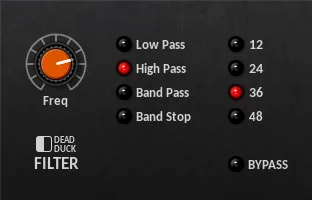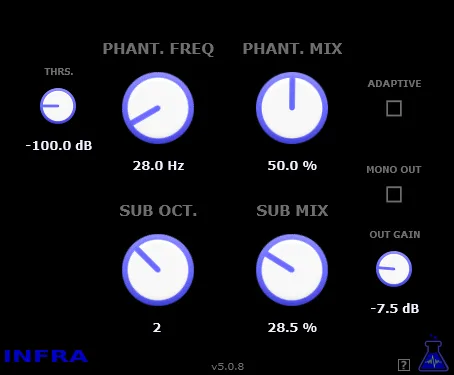In the world of music creation and sound design, tools that allow for shaping and modifying audio signals play a crucial role. Among these, filters hold a special place – powerful instruments for correcting frequency balance, removing unwanted artifacts, or, conversely, for creatively transforming audio. Today, we’ll take a detailed look at one such tool from Dead Duck Software – the VST plugin called DD Filter.
Advanced Filtering Capabilities: DD Filter
DD Filter is not just a standard filter. It’s a multi-mode filter, developed by the talented team at Dead Duck Software. Its primary purpose is to provide musicians, producers, and sound engineers with a flexible and effective tool for working with the frequency palette of their tracks. Multi-mode means that the plugin is capable of performing the functions of different types of filters, making it a versatile workhorse in your arsenal of VST effects.
Filtering is a fundamental technique in audio processing. It can be used for both surgical correction (e.g., removing low-frequency hum or high-frequency hiss) and for artistic sound shaping (creating wah-wah effects, changing the timbre of an instrument, forming transitions and swells). DD Filter offers capabilities that cover a wide range of these tasks.
The plugin from Dead Duck Software is known for its stability and efficiency. While the specific interface details and the full set of filtering modes may only be known after installation, the very concept of a multi-mode filter indicates its potential flexibility. This may include such common modes as:
- Low-Pass Filter (LPF): Passes frequencies below a set cutoff point, attenuating or completely removing high frequencies. Ideal for softening the brightness of sound or creating an “underwater” sound effect.
- High-Pass Filter (HPF): Passes frequencies above a set cutoff point, removing or attenuating low frequencies. Often used to clean up the mix from excessive bass or hum.
- Band-Pass Filter (BPF): Passes only frequencies within a certain range, attenuating frequencies above and below that range. Useful for highlighting a specific element in the mix or creating a telephone effect.
- Band-Stop Filter or Notch Filter: Conversely, attenuates or removes frequencies within a specific narrow range, passing all others. Used to remove specific unwanted frequencies (e.g., mains hum).
The presence of these and possibly other modes makes DD Filter a versatile tool for sound sculpting.
Key Features and Benefits
Considering DD Filter as a tool in your workflow, it is worth highlighting the key points:
- Multi-mode: Allows you to choose different types of filtering within a single plugin, saving time and resources.
- Flexibility of application: From simple correction to complex sound transformations.
- Developer Dead Duck Software: The company is known for creating stable and functional plugins.
Using a quality filter can significantly improve the clarity, dynamics, and overall quality of your mix. DD Filter, being a multi-mode tool, provides ample space for experimentation and fine-tuning the sound.
Compatibility and Technical Requirements
An important aspect of any software is its compatibility with your system. DD Filter is presented in the VST format, which is one of the most common plugin standards for Digital Audio Workstations (DAWs) on Windows operating systems.
The plugin is available for Windows users, supporting both 32-bit (Win32) and 64-bit (Win64) architectures. This provides wide compatibility with most modern and older DAWs on this platform. Make sure that your DAW supports VST plugins of the appropriate bit-depth.
Installing the plugin is usually a simple process: you need to download the file, unpack it (if necessary), and copy the plugin files into the appropriate folder that your DAW scans. After that, restart the DAW, and the plugin should appear in the list of available effects.
DD Filter from Dead Duck Software is an interesting and potentially very useful addition to the toolkit of any Windows user who works with sound in a VST environment. Its multi-mode nature makes it a versatile solution for a wide range of tasks – from basic equalization to creative sound design. If you are looking for a flexible and efficient filter, DD Filter definitely deserves your attention.



